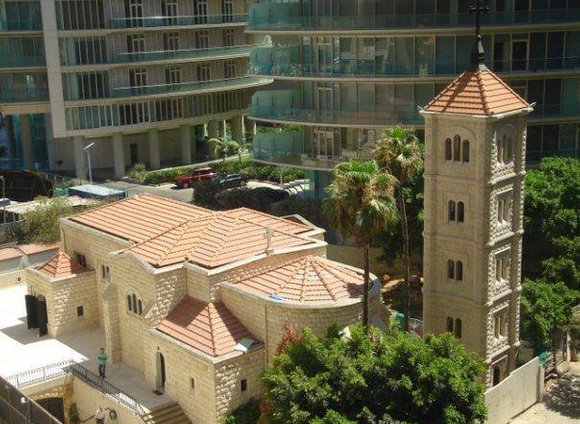 All Saints Anglican Church on Lebanon’s Mediterranean shore
All Saints Anglican Church on Lebanon’s Mediterranean shore
All Saints Anglican Church on Lebanon’s Mediterranean shore suffered “material damage” in last week’s massive explosions in Lebanon.
Latest figures show that some 220 people have been killed and a further 7,000 injured by the two explosions. The second of the blasts is thought to have occurred when 2,750 tonnes of ammonium nitrate being stored in a port warehouse was ignited by flames or sparks from the first blast. The resulting explosion – estimated to have been equivalent to 1.2 kilotons of TNT – could be heard more than 150 miles away on the island of Cyprus.
The Anglican Archbishop in Jerusalem, Suheil Dawani, whose diocese includes Lebanon, has launched an emergency appeal to aid the diocesan response. “Since the explosion, we have been in constant communication with Imad Zoorob, Archdeacon over Lebanon and Syria, who also serves as the Rector of All Saints Episcopal Church in Beirut, located about a mile from where the blast took place”, Archbishop Suheil said. “In the aftermath of the explosion, he was able to assess the status of our two resident congregations there, as well as the damage to All Saints and to our complex at the Near Eastern School of Theology (NEST).
“The good news is that no member of our congregations was killed or seriously hurt. However, All Saints’ Parish Hall and Vestry were damaged, likely requiring tens of thousands of dollars of repairs. Miraculously, the stained glass in the church nave and sanctuary held firm so there is no damage there, though there is some in the sacristy. There is also no damage to Saint Luke’s School in the more distant mountains. On the other hand, many of our parishioners’ apartments suffered damage, as did our Anglican Centre at NEST.”
The Anglican Diocese of Jerusalem is a co-sponsor of Lebanon’s Near Eastern School of Theology, alongside the Armenian Evangelical Church, the National Evangelical Synod, and the Lutheran Church. It trains most of the clergy in the diocese. NEST’s President, George Sabra, said that the centre had suffered more in this blast than it had during the Civil War.
The Middle East Facilitator for the Anglican Alliance, Joel Kelling, said that pretty much all the glass and doors in the centre has been destroyed. “They say the challenge is going to be finding not only the money, but the actual physical glass resources, as well as the labour to replace all the damage done, given that has affected half the city”, he said. “The staff are working to put up nylon sheeting in the meantime, having worked to sweep glass”
At All Saints Church, the church hall windows and doors were broken in the blast, “which has done material damage to the interior of the hall”, Joel Kelling said.
The Diocese’s St Luke’s Centre for Disabled Children was closed because of the Covid-19 pandemic; but suffered no damage.
“The explosion was massive. So much was damaged, not only at All Saints, but parishioners’ homes”, Archdeacon Imad said. “Thank God none of the parishioners was hurt, but I’m busy working to sort out the church and support at least 18 people affected by the explosion. I am working with the diocese to help financially and to clean their homes.
“Thank God the pupils at St Luke’s were away because of Coronavirus, and we’ve not suffered any damage there – so far.”
A member of the Parochial Church Council at All Saints, Colin Gibson, said: “the extent of devastation is shocking. There is a lot of despair. People feel at the end of their tether, with the economic meltdown, the Covid-19 pandemic – and now this.”
The economic situation in Lebanon “was already desperate” even before the explosion, Rachel Carnegie, Executive Director of the Anglican Alliance, said. “The Anglican Alliance was in touch already with the Province to hear how the local church was responding to the devastating economic crisis.
“Accounts were emerging of people in acute difficulties. Amongst these, some of the most marginalised, in this case foreign domestic workers, were being turned out of homes and left destitute on the streets as their employers could no longer afford to keep them.
“The Anglican Alliance has connected with partners in the Communion, especially Episcopal Relief & Development, to help support the church in Lebanon in helping these highly vulnerable migrants, many from Africa. The humanitarian situation has of course been rendered even more desperate by last week’s disaster.”
She said that support for Archbishop Suheil’s emergency appeal “will be crucial to rebuild lives, hope and the church institutions – some of which are being rebuilt a third time after the former years of conflict.”
The diocese is linked with Dublin & Glendalough.
All Saints, Bierut
[[] https://www.allsaintsbeirut.com/ ]
All-Saints-Bierut.jpg


